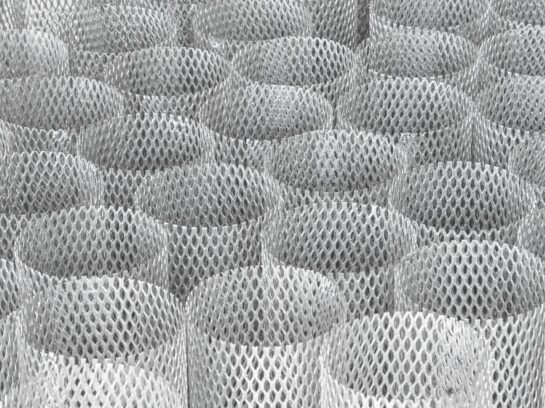At Precision Fabricating & Cleaning (PFC), among our many cleaning and testing services is bubble point testing for filters that separate solids from liquids and/or gases. You may be wondering, what is bubble point testing? Why is it used, and what types of filters is it used on? Those are some of the questions we answer in this article.
What Is Bubble Point?
Bubble point is an indirect measurement of the largest pore in a filter. More specifically, it is a function of pore size, the wettability of the filter medium, surface tension, and angle of contact.
Bubble point is based on the fact that liquid is held in the pores of the filter by surface tension and capillary forces. The minimum pressure required to force liquid out of the pores is a measure of the pore diameter.
What Is Bubble Point Testing?
To determine a filter’s bubble point, we need to perform a common procedure called a bubble point test.
During the test, we wet the filter membrane with isopropyl alcohol. Next, we gradually increase gas pressure on the membrane. Eventually, a steady stream of bubbles, known as the “first bubble,” will emerge from the largest pore in the membrane. The measurement of gas pressure at this moment is the bubble point for the filter.
Wetting the membrane is crucial to a successful bubble point test. If the membrane is dry, air will flow through it prematurely and disrupt the stream of bubbles.
It’s also important to measure the gas pressure at just the right moment. Diffusive airflow through the filter will occur at a lower pressure than the bubble point. Experts like our testers at PFC are precise and will take a measurement at the moment the first bubble stream forms. This way, the bubble point measurement is as accurate as possible.
Why Perform A Bubble Point Test?
The reason we perform bubble point tests on filters is to measure the size of the largest pore, which will in turn help us determine the integrity of the filter itself. The integrity tells us if the filter will perform well in its application, and if it’s safe enough to use. It’s the best way to check if any part of the filter is damaged, as in a leak or a faulty seal.
Another reason to perform a bubble point test instead of another type of test is that it is non-destructive. The filter will still work after the process is finished, providing the test didn’t reveal any pre-existing flaws or damage.
Types Of Filters That Use Bubble Point Testing
There are four common types of filters that can be evaluated using the bubble point testing method.
Dutch Twill, Wire Mesh
Dutch twill, wire mesh is a type of filter that is made of Shute wires woven over and under two warp wires. The result is a tight mesh that is strong and provides fine filtration with a low flow rate.
Sintered
A sintered filter is made through the process of sintering. This procedure involves mixing and then fusing together copper and metal alloys into a porous mesh. Sintered filters are able to withstand both high pressures and high temperatures.
Depth Filter
Depth filters are designed to trap particles throughout the liquid medium, rather than just the particles on the medium’s surface. The latter is the function of mesh and sintered filters.
Stacked Disc
A stacked disc filter consists of disc-shaped filters stacked on top of one another and attached to an inner core.
PFC Helps Ensure Filter Integrity With Standardized Bubble Point Testing
At PFC, our bubble point test procedures are written in accordance with SAE ARP901. SAE stands for the Engineering Society For Advancing Mobility Land Sea Air and Space International. This is an institution that defines standards for mobility engineering around the world. The ARP901 is their recommended practice for aerospace applications.
By following an industry standard procedure for bubble point testing, we ensure that our tests are performed safely and efficiently, with accurate results to ensure the efficacy of filters for your cleaning and testing applications. This way, you know your filters will perform well and won’t pose unnecessary dangers to you or anyone who works with or near them. Reach out to us for your bubble point testing needs, right here.

